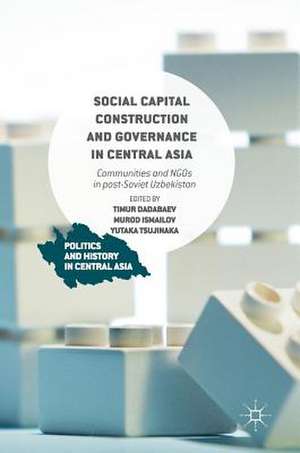Social Capital Construction and Governance in Central Asia: Communities and NGOs in post-Soviet Uzbekistan: Politics and History in Central Asia
Editat de Timur Dadabaev, Murod Ismailov, Yutaka Tsujinakaen Limba Engleză Hardback – 28 mar 2017
This cutting edge collection focuses on the nature of civil society and its role in facilitating governance in Central Asia, considering local implications related to the concept of social capital and civil society in the Uzbek context. It discusses the complexity of the notion of social capital in post-Soviet Uzbekistan, detailing the challenges and pressures facing the Uzbek people.
Challenging prevailing views on post-Soviet political transitions, the book demonstrates that successful transition to democracy and rule of law cannot be accomplished unless the concerns, fears, frustrations and local understandings of the desired political system are heard, registered and carefully interpreted. Offering a comparative study of civil society and social capital in Asia, this collection is a key read not only for scholars and students in civil governance and post-soviet transitions, but also aid agencies, foreign governments, and international organisations working with civilsociety groups.
Preț: 695.85 lei
Preț vechi: 818.64 lei
-15% Nou
Puncte Express: 1044
Preț estimativ în valută:
133.16€ • 138.24$ • 111.04£
133.16€ • 138.24$ • 111.04£
Carte tipărită la comandă
Livrare economică 22 martie-05 aprilie
Preluare comenzi: 021 569.72.76
Specificații
ISBN-13: 9781137522320
ISBN-10: 1137522321
Pagini: 186
Ilustrații: XI, 186 p. 15 illus., 14 illus. in color.
Dimensiuni: 148 x 210 x 13 mm
Greutate: 0.39 kg
Ediția:1st ed. 2017
Editura: Palgrave Macmillan US
Colecția Palgrave Macmillan
Seria Politics and History in Central Asia
Locul publicării:New York, United States
ISBN-10: 1137522321
Pagini: 186
Ilustrații: XI, 186 p. 15 illus., 14 illus. in color.
Dimensiuni: 148 x 210 x 13 mm
Greutate: 0.39 kg
Ediția:1st ed. 2017
Editura: Palgrave Macmillan US
Colecția Palgrave Macmillan
Seria Politics and History in Central Asia
Locul publicării:New York, United States
Cuprins
Theoretical implications of and methodological approaches to studying social capital in Uzbekistan.- Introduction to Survey Research in Post-Soviet Central Asia: Tasks, Challenges and Frontiers.- Domestic Discourse on Civil Society and Social Capital.- Between state and society: The position of the Mahalla in Uzbekistan.- Social Capital and Liberal Democracy.- Civil society and environmental issues.- Weaknesses and capacities of domestic NGOs.- Comparing two Asian perspectives: Nurturing social capital in Uzbekistan and Japan.
Notă biografică
Timur Dadabaev is an Associate Professor of International Relations at the University of Tsukuba, Japan and Director of Combined MA and Ph.D. Program in Central Eurasian Studies.
Murod Ismailov is an Assistant Professor of International Relations at the University of Tsukuba, Japan.
Yutaka Tsujinaka is Professor of Political Science at the University of Tsukuba, Japan.
Murod Ismailov is an Assistant Professor of International Relations at the University of Tsukuba, Japan.
Yutaka Tsujinaka is Professor of Political Science at the University of Tsukuba, Japan.
Textul de pe ultima copertă
This cutting edge collection focuses on the nature of civil society and its role in facilitating governance in Central Asia, considering local implications related to the concept of social capital and civil society in the Uzbek context. It discusses the complexity of the notion of social capital in post-Soviet Uzbekistan, detailing the challenges and pressures facing the Uzbek people.
Challenging prevailing views on post-Soviet political transitions, the book demonstrates that successful transition to democracy and rule of law cannot be accomplished unless the concerns, fears, frustrations and local understandings of the desired political system are heard, registered and carefully interpreted. Offering a comparative study of civil society and social capital in Asia, this collection is a key read not only for scholars and students in civil governance and post-soviet transitions, but also aid agencies, foreign governments, and international organisations working with civilsociety groups.
Caracteristici
Offers an alternative take on prevailing western interpretations of post soviet political and civil transitions, taking into account the role social capital and civil society








